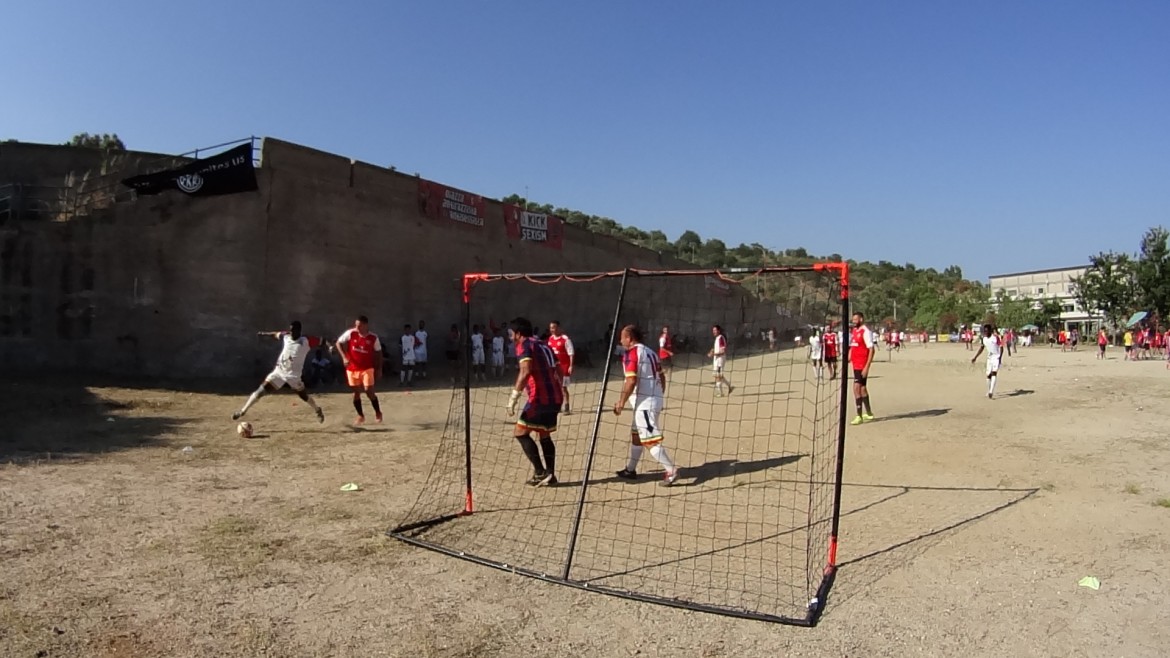Reportage
Anti-Racist World Cup challenges neo-fascist tendency in Italy
As Italian government policy condemns migrants to the sea, people of all backgrounds took part in a soccer tournament built on solidarity. ‘The ball doesn’t care who is playing with it.’

People are playing soccer on a field set up on a terrace overlooking the Ionian Sea—the sea that has become a destination for thousands of people, sometimes carrying them to safety, at other times drowning them in its depths. The seaside landscape of Riace has opened its doors to fans of popular sports, and to activists in the social movements.
Hundreds of sports fans have come to Calabria from all over Europe to attend the Anti-Racist World Cup. They’re playing soccer, volleyball, basketball and beach rugby. Among them, there are even a few hardcore soccer fans, the ultras—those who have not let themselves be carried away by the paramilitary drift that is taking over soccer fan movements across Europe. There are 60 teams, men and women: English, German, Mediterranean, African, black and white, they’re all competing in a tournament that is a tribute to multiculturalism.
There are no referees. The rules are enforced by common agreement. No serious fouls are tolerated, and two committed by one team means they forfeit the game. When a team is clearly inferior to their opponent and down by at least two goals, they can add an extra player on the pitch. The regulations also include “roaming” players, meaning a person who, “due to physical or motor disability, or early age, is not fully aware of the dynamics of the game and can play for a team without being counted in the number of players. This person, if they receive the ball, cannot be subject to pressing.”
Now in its 23rd edition, the Anti-Racist World Cup, an initiative promoted by the NGO UISP, has come to Riace, a town still in turmoil from the electoral defeat of Mimmo Lucano. In the festive and peaceful atmosphere, including public debates, cheers from the public for every goal scored and even DJ sets, there is also one particularly surreal element: the permanent presence of the many police officers and carabinieri who are keeping an eye on the players at the UISP World Cup.
This is the ominous shadow cast by the Lega-sympathizing new mayor, Antonio Trifoli, who seems to have been ineligible to run for the office in the first place because he had a fixed-term contract with the city as safety inspector. According to Legislative Decree 267 of Aug. 18, 2000, he was not eligible to run for mayor. He would have needed to resign from his job first—which he did not do, instead obtaining a temporary leave of absence, in violation of the law, from the Riace interim authorities.
On the first evening of the event, at a campsite outside the territory of Riace—from which he is still banned by court order—Lucano welcomed the participants personally, and recounted the events of the past few months: “The Lega’s politics has reawakened the cultural attitude of the Mafia,” he warned.
He praised the philosophy of sportsmanship permeating the event: “It’s a wonderful thing to have soccer without referees.” One of the perennial supporters of the tournament is FARE, a network fighting against inequality and discrimination in football. They had a clear message about the aim of the event: “To remember the stories of individuals who have struggled to escape from dramatic situations in their countries of origin, or simply to improve their personal situation through study and work.” There are so many who fit that description among the young people who have signed up to kick a ball around in these three days in Riace, showing enough technical and physical prowess to take up the sport professionally.
Many of them are working as “riders” or delivery people for logistics companies. Some have a little experience in Italian amateur football clubs. In this alternative World Cup, they chose to wear the jerseys of established sports clubs or their own improvised local teams, many of which have names showing their origins in the neighborhoods of the southern urban centers: Catanzaro Social Team, Scampia Antirazzista (“Anti-Racist Scampia”), Spartak Lecce, Cosenza Mmishkata, Villa San Giovanni Meticcia (“Mixed-Race Villa San Giovanni”).
Everywhere, there are focused faces, muscles and sweat. In the best tradition of the tournament, the sunset brings a unique experience: fires are lit, beers cracked open, and collective songs are sung all over the esplanade that is welcoming so many different languages and colors. Everyone was looking forward to the final, which was played on Sunday at 1 p.m. There was plenty of heat, but not so much tension among players: from the quarterfinals on, all matches were decided on penalties.
The organizers are aware of how the game of soccer unfortunately lends itself to stoking tensions and can unleash aggressive impulses. It didn’t do so among the participants in this World Cup. Their message, printed on their gadgets and T-shirts, was an old slogan of the anti-Nazi soccer fans: “The ball doesn’t care who is playing with it.”
Originally published at https://ilmanifesto.it/leresia-in-campo-a-riace-il-mondiale-di-calcio-antirazzista/ on 2019-07-07
